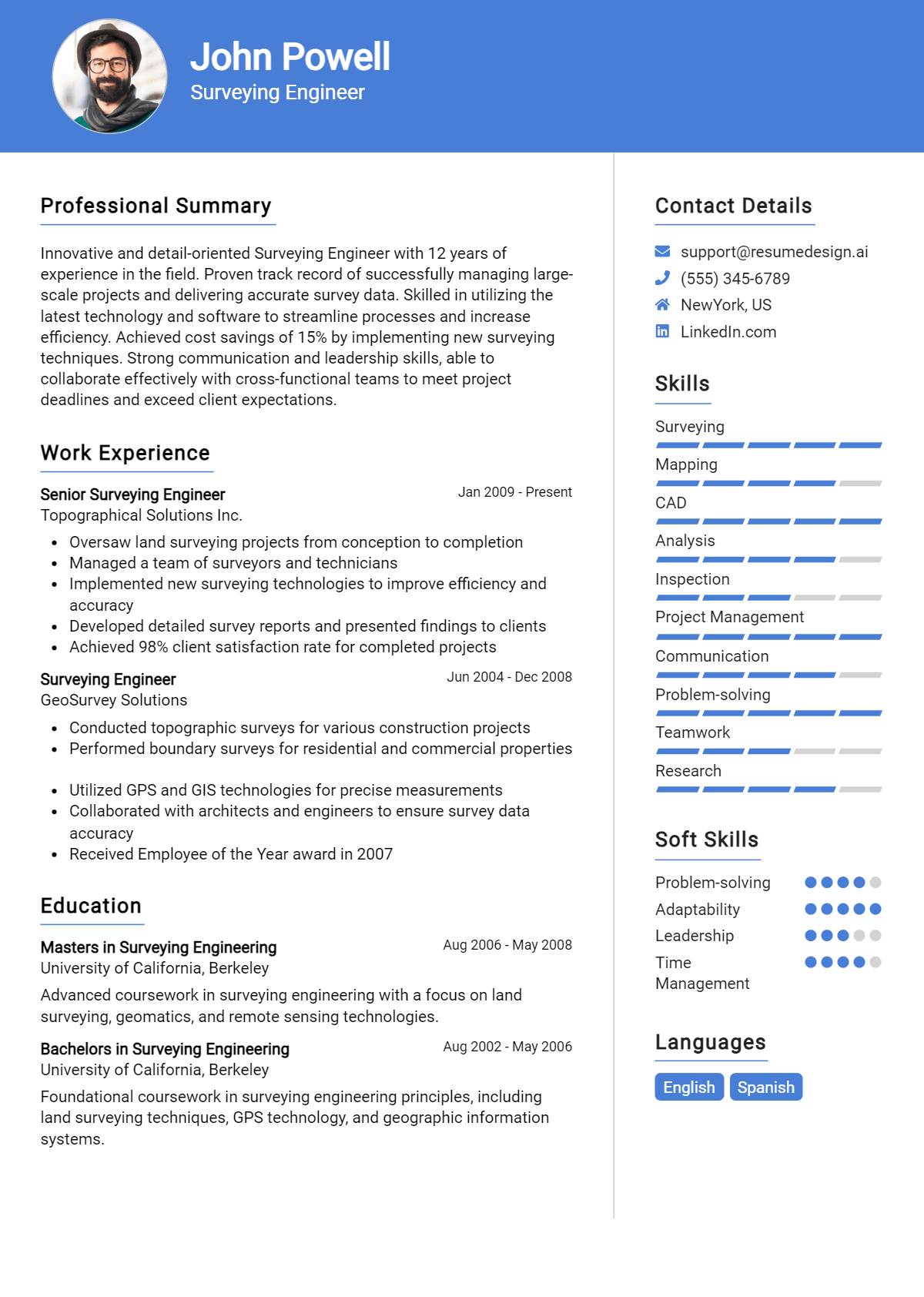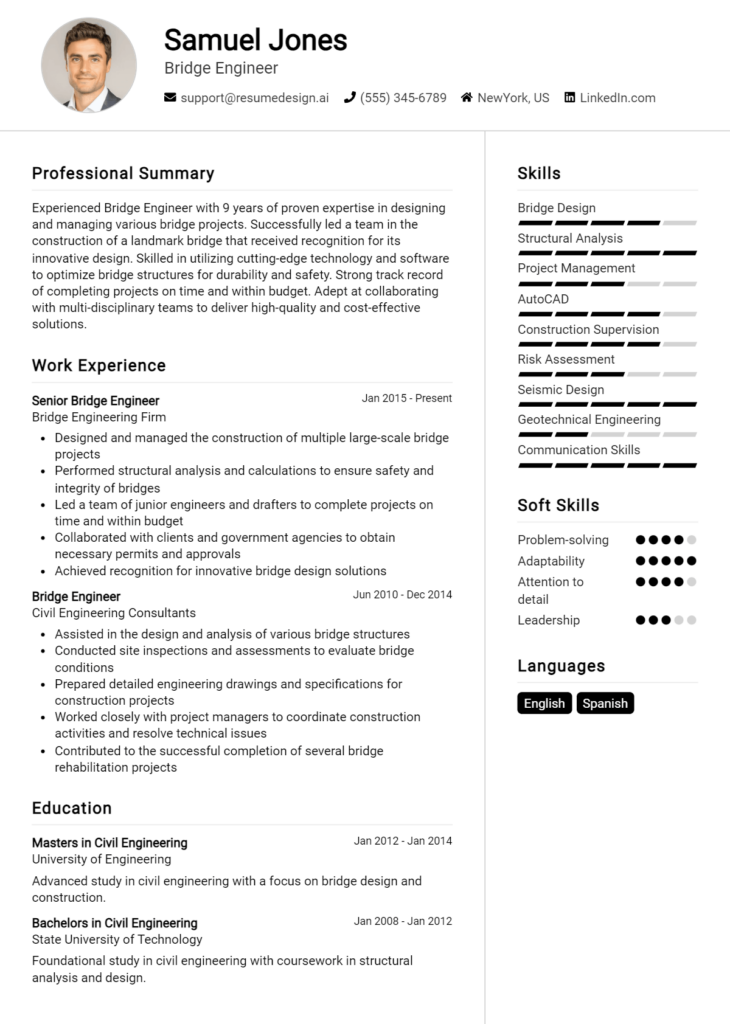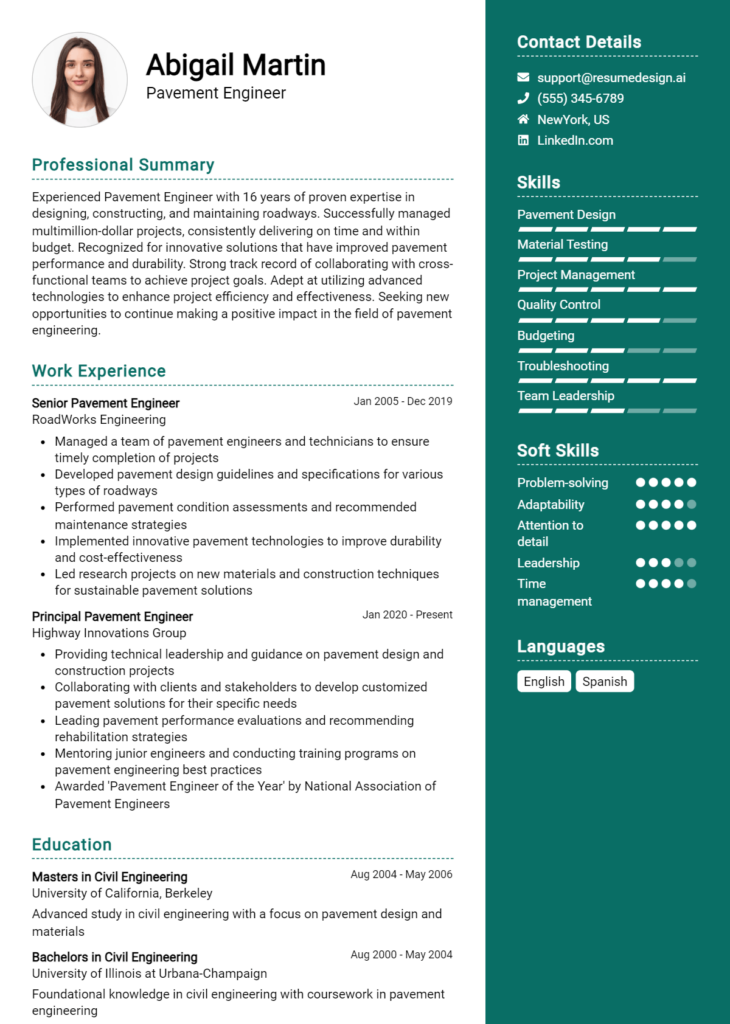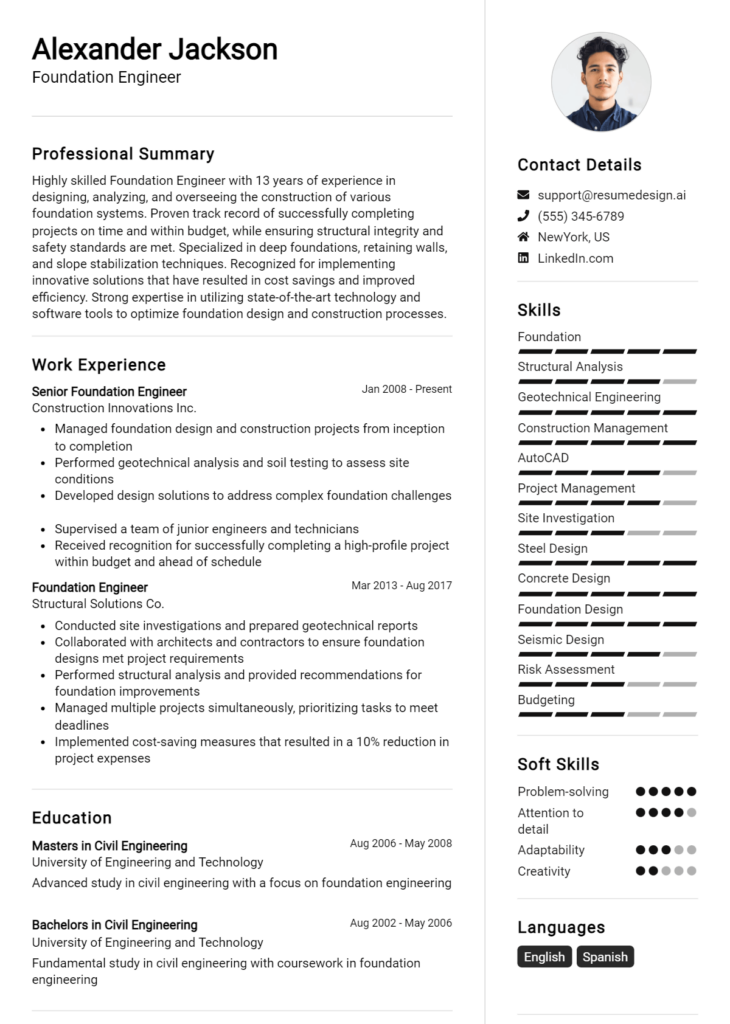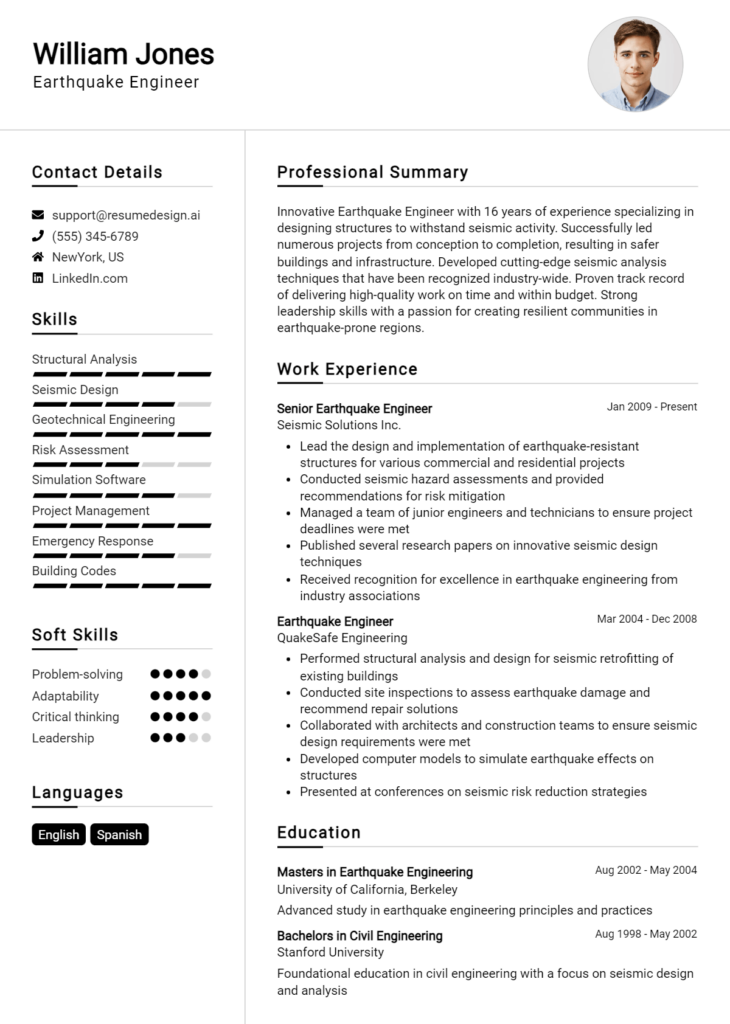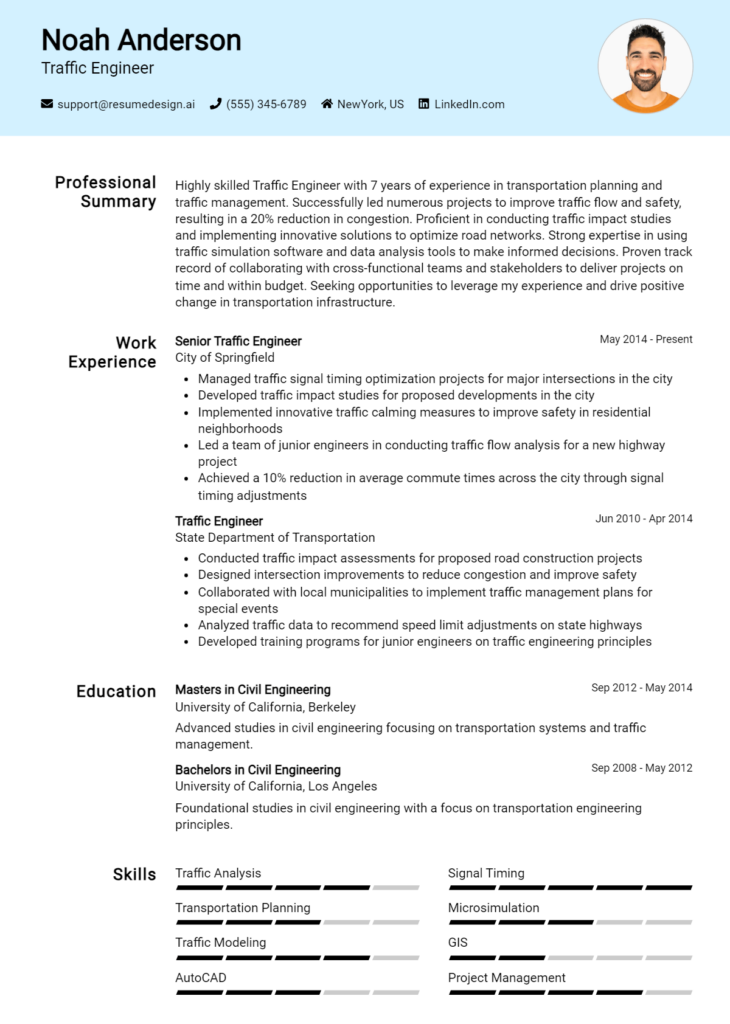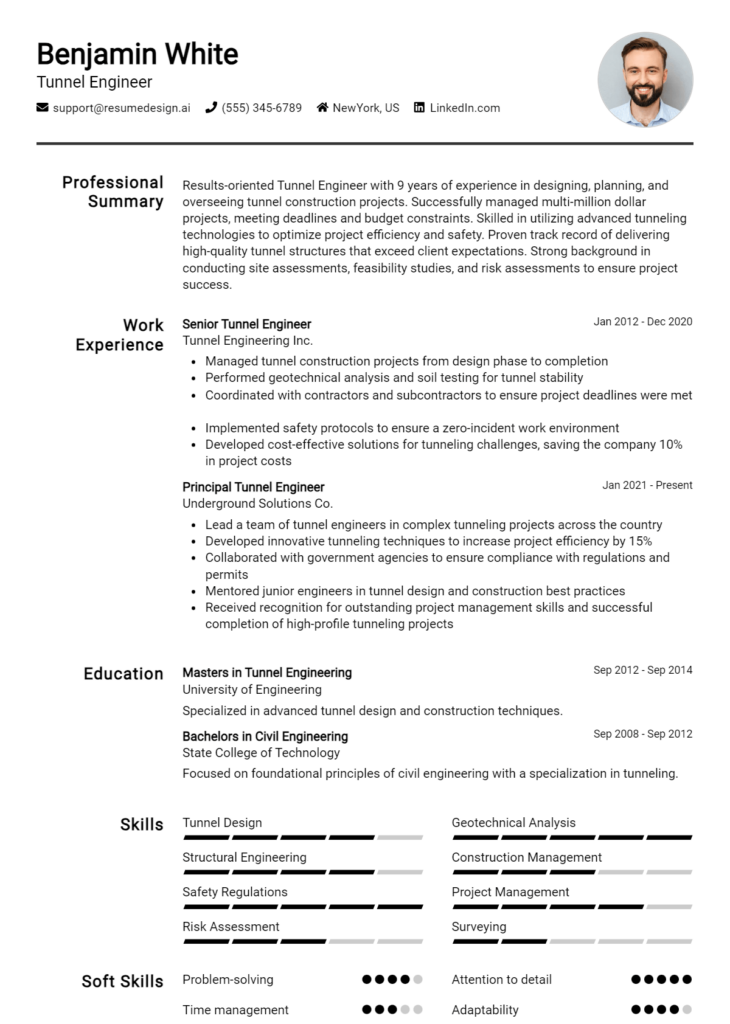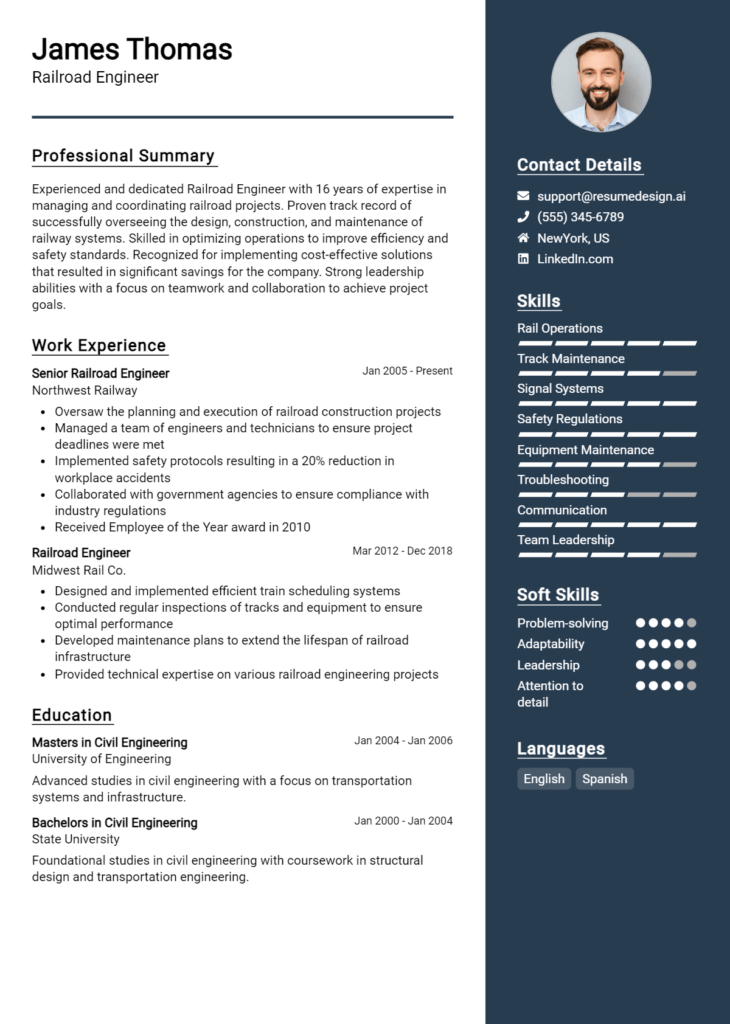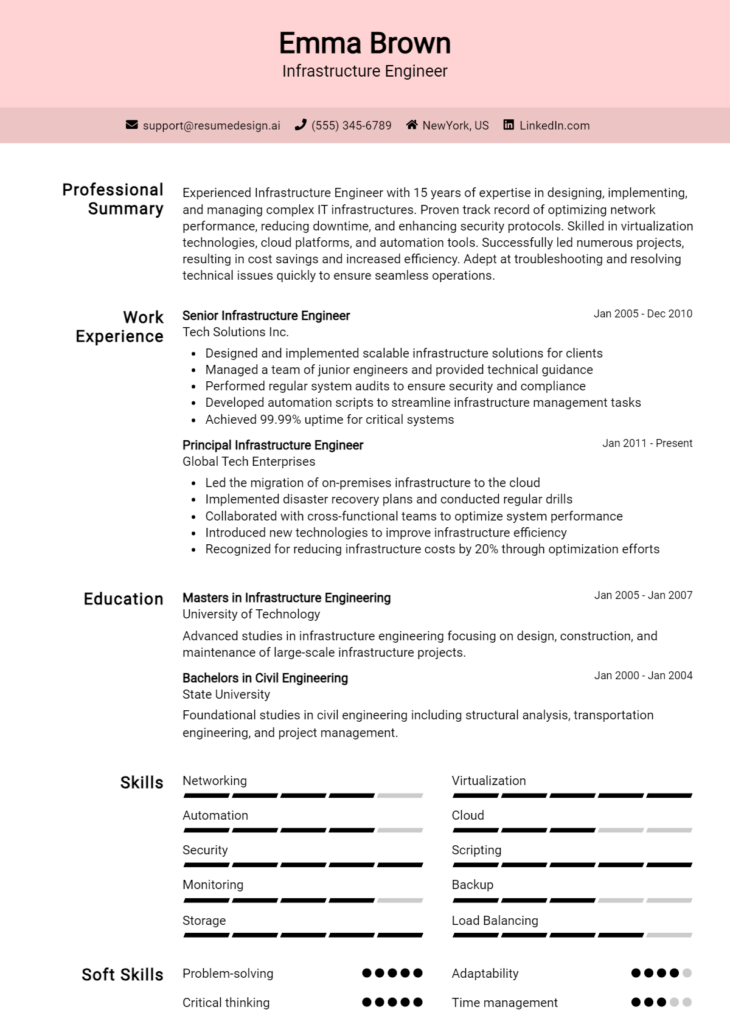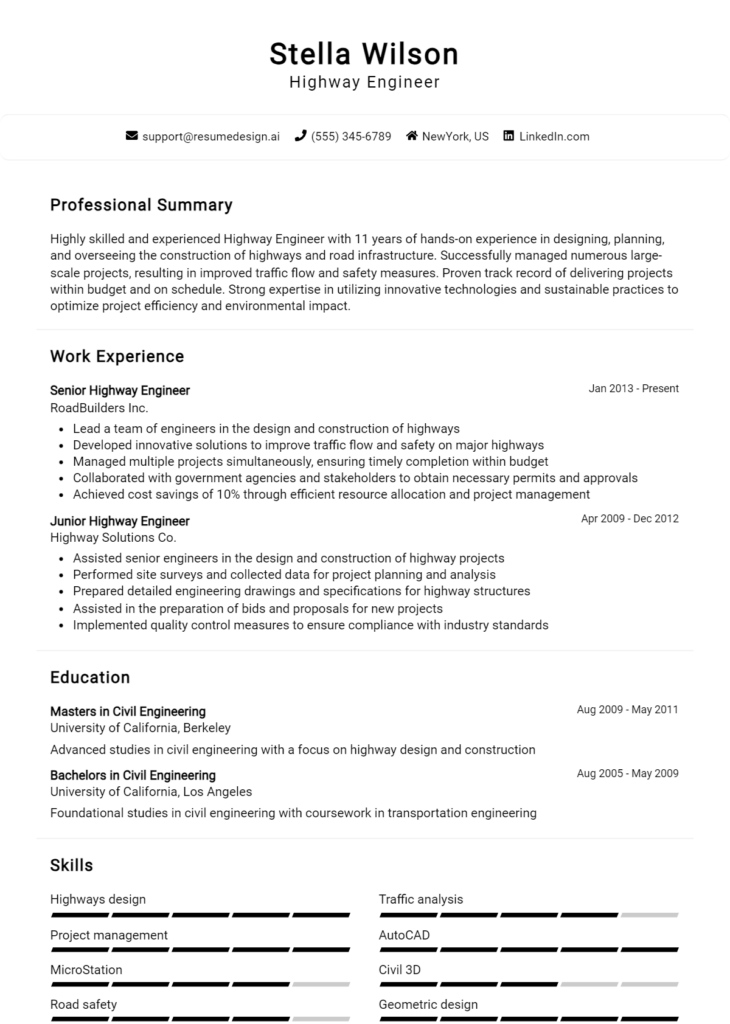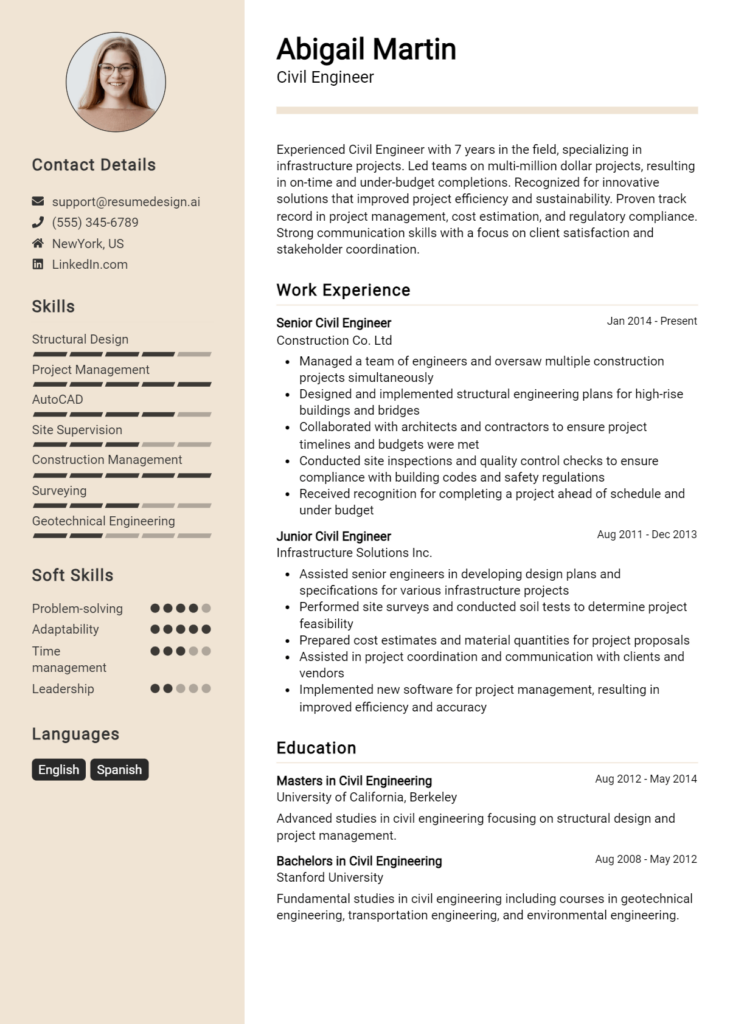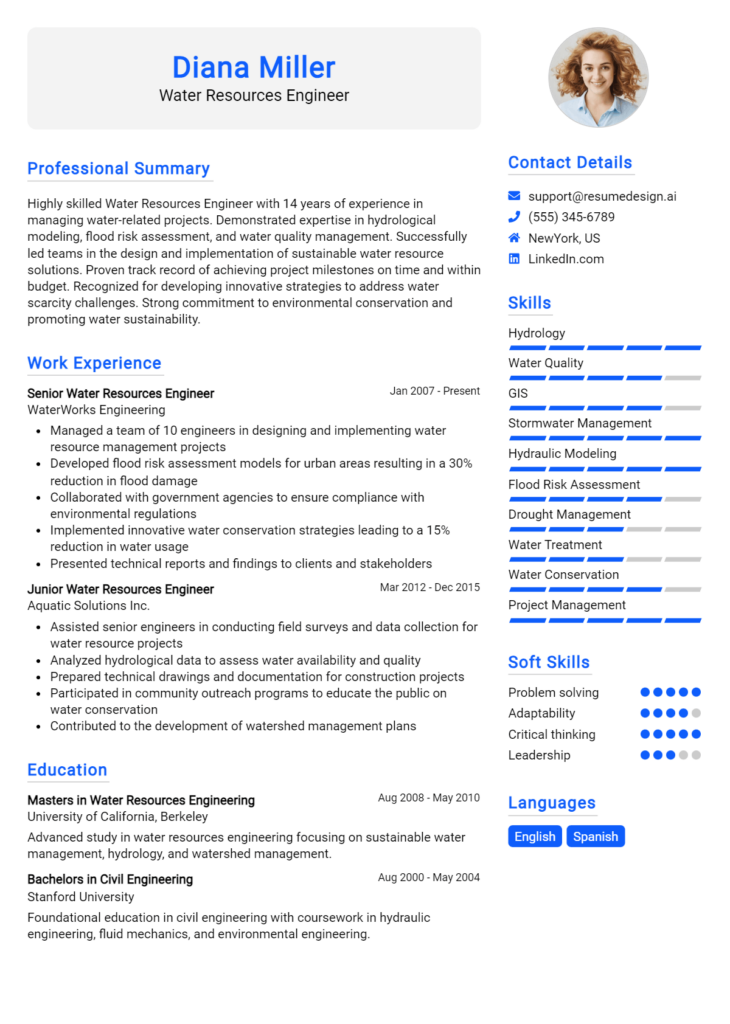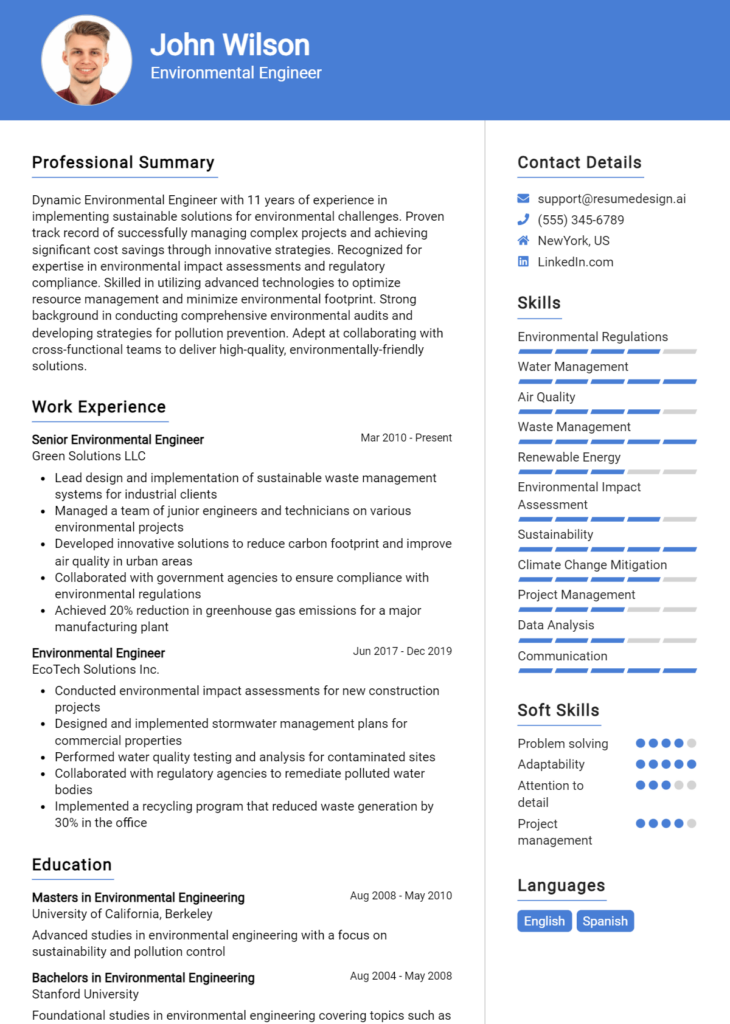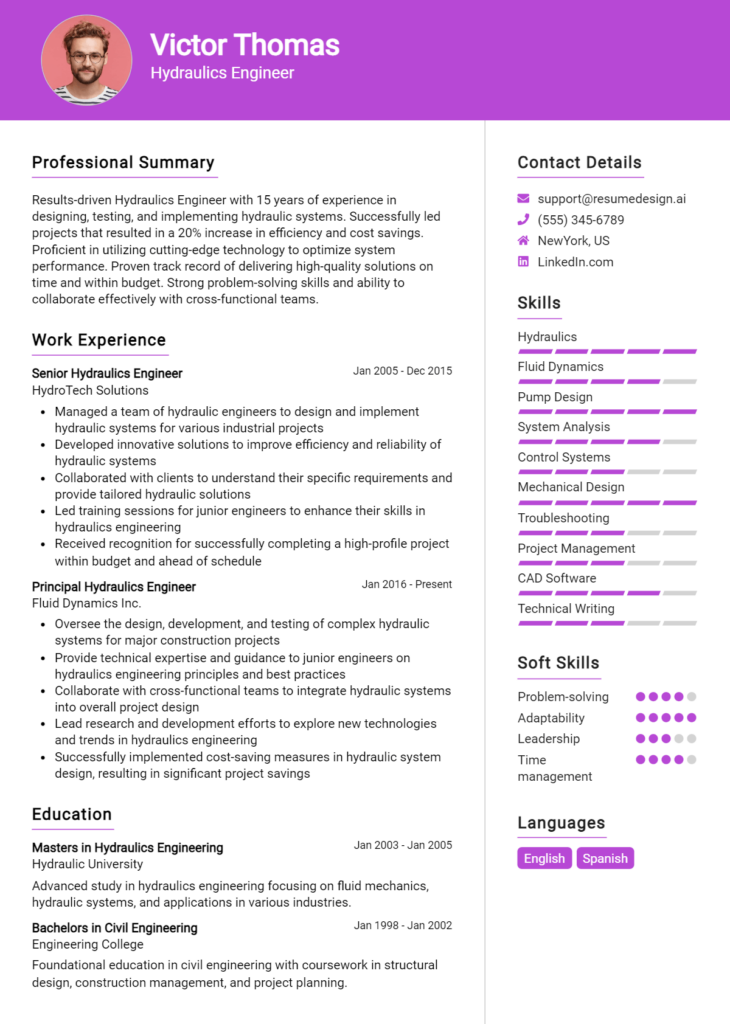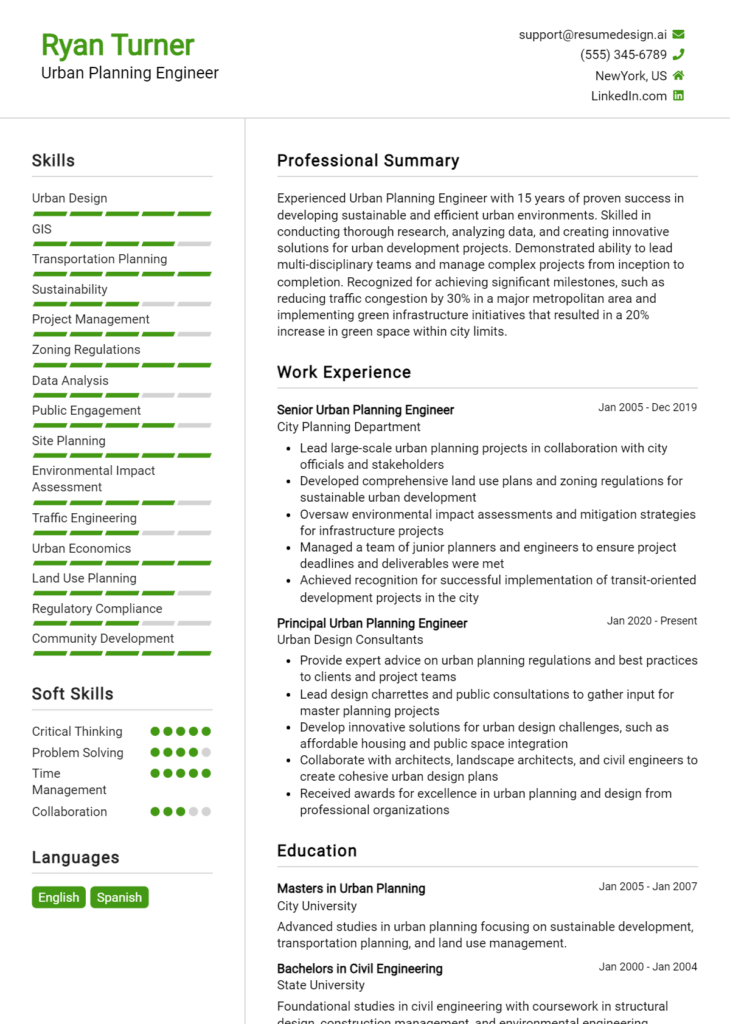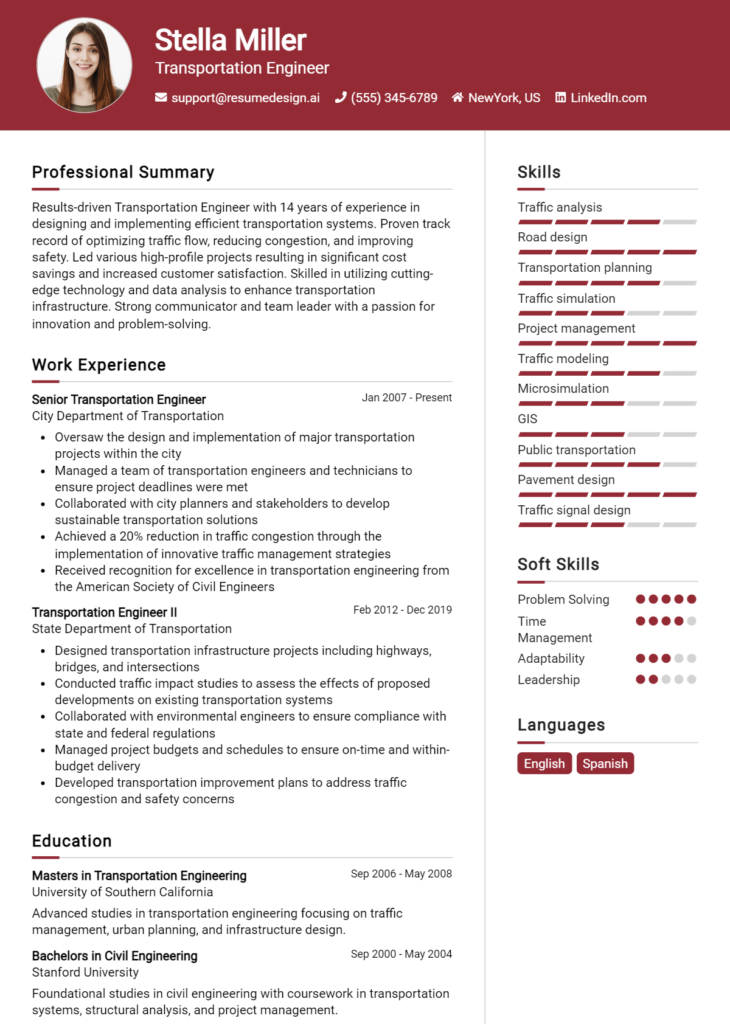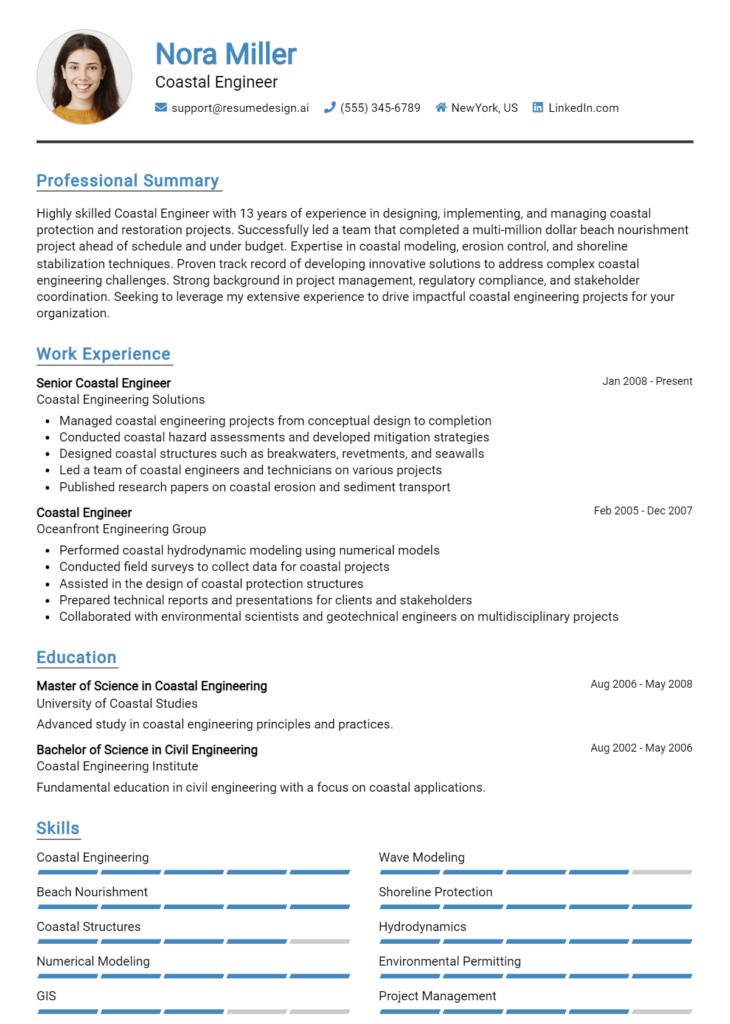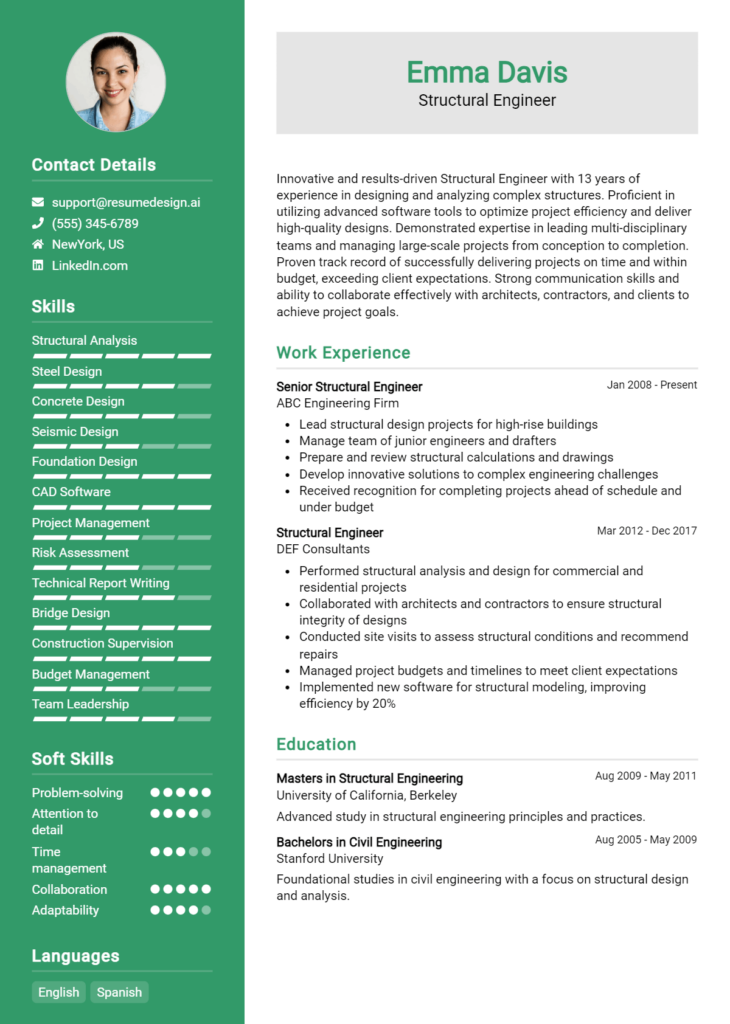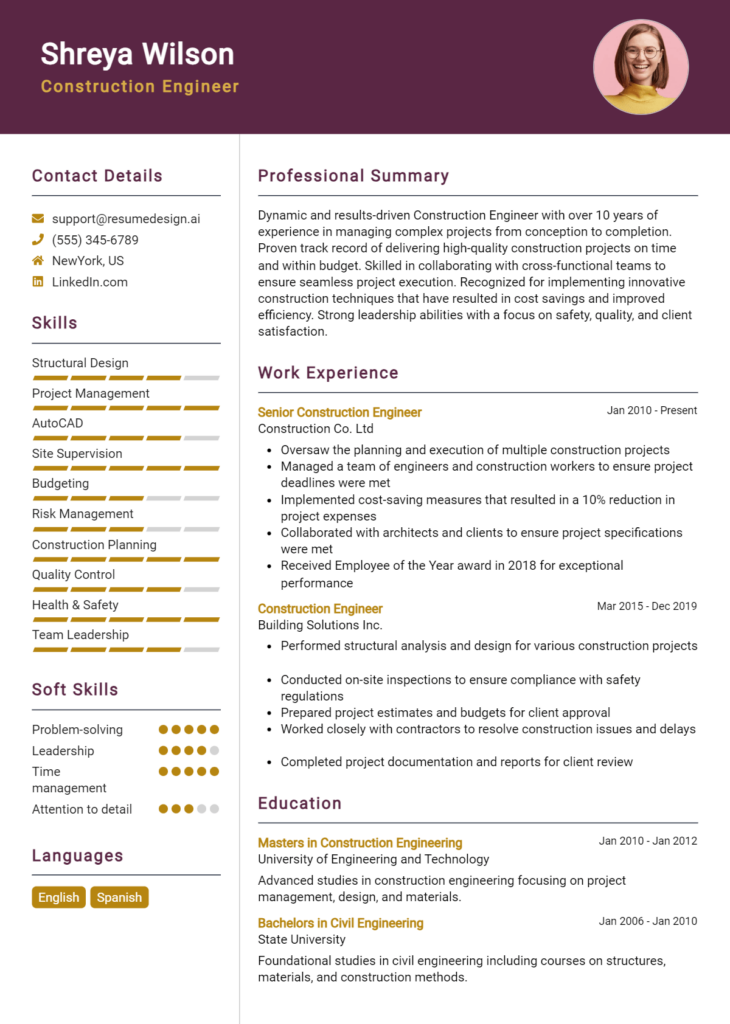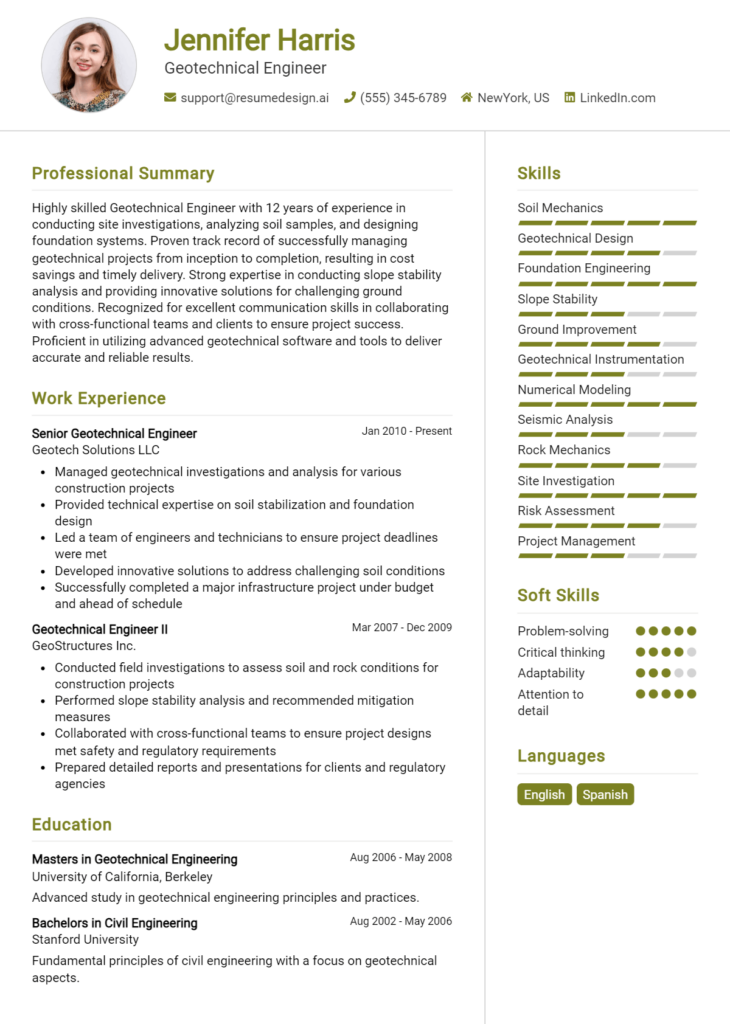Surveying Engineer Core Responsibilities
A Surveying Engineer plays a crucial role in bridging various departments within construction, engineering, and land development projects. Key responsibilities include conducting precise measurements, preparing survey reports, and collaborating with architects and contractors to ensure project compliance. Strong technical skills, operational expertise, and advanced problem-solving abilities are essential for success in this role. These competencies not only enhance project efficiency but also align with the organization's strategic goals. A well-structured resume can effectively highlight these qualifications, showcasing the candidate’s ability to contribute meaningfully to the team.
Common Responsibilities Listed on Surveying Engineer Resume
- Conduct land surveys using advanced equipment and technology.
- Prepare detailed survey reports and maps for project planning.
- Collaborate with architects, engineers, and construction teams.
- Analyze survey data for accuracy and compliance with regulations.
- Develop and implement surveying methodologies and best practices.
- Coordinate with local authorities and stakeholders for permits.
- Utilize CAD software for drafting and design purposes.
- Conduct site assessments and feasibility studies.
- Manage project timelines and budgets related to surveying tasks.
- Mentor junior survey staff and provide training as needed.
- Ensure adherence to safety protocols and industry standards.
- Resolve technical issues and discrepancies in survey data.
High-Level Resume Tips for Surveying Engineer Professionals
In the competitive field of Surveying Engineering, a well-crafted resume serves as your first opportunity to make a lasting impression on potential employers. Your resume is not just a summary of your work history; it is a powerful marketing tool that needs to effectively showcase your skills, achievements, and unique qualifications. A strong resume can set you apart from other candidates and draw attention to your expertise in survey techniques, project management, and data analysis. This guide will provide practical and actionable resume tips specifically tailored for Surveying Engineer professionals, ensuring that your application stands out in a crowded job market.
Top Resume Tips for Surveying Engineer Professionals
- Tailor your resume to the specific job description by incorporating relevant keywords and phrases that align with the position.
- Highlight your relevant experience in surveying projects, including internships, co-ops, and professional roles.
- Quantify your achievements with specific metrics (e.g., “Reduced project completion time by 15% through efficient resource management”).
- Showcase industry-specific skills, such as proficiency in surveying software (e.g., AutoCAD, GIS) and understanding of local regulations.
- Include certifications and licenses relevant to surveying, such as Professional Land Surveyor (PLS) or Engineer in Training (EIT).
- Use action verbs to describe your responsibilities and accomplishments, making your contributions clear and impactful.
- Organize your resume into clear sections, such as Professional Summary, Skills, Experience, and Education, to improve readability.
- Keep your resume concise, ideally one page, focusing on the most important and relevant information.
- Consider adding a section for relevant professional affiliations or memberships, such as the American Society of Civil Engineers (ASCE).
By implementing these targeted resume tips, you can significantly increase your chances of landing a job in the Surveying Engineer field. A well-structured and tailored resume not only highlights your qualifications but also demonstrates your commitment to the profession, making you a more attractive candidate to potential employers.
Why Resume Headlines & Titles are Important for Surveying Engineer
In the competitive field of surveying engineering, a well-crafted resume headline or title plays a crucial role in capturing the attention of hiring managers. A strong headline serves as an effective hook, summarizing a candidate's key qualifications and unique selling points in one impactful phrase. By being concise, relevant, and directly related to the job being applied for, a compelling headline can make a significant difference in how a resume is perceived, setting the tone for the rest of the application and enhancing the chances of being shortlisted for an interview.
Best Practices for Crafting Resume Headlines for Surveying Engineer
- Keep it concise: Aim for a headline that is brief yet descriptive.
- Use relevant keywords: Include terms specific to surveying engineering to align with the job description.
- Highlight key skills: Focus on core competencies that are essential for the role.
- Be specific: Avoid vague language; detail your specialization or unique strengths.
- Showcase achievements: If possible, reflect on notable accomplishments or certifications.
- Tailor for the job: Customize your headline for each position you apply for to enhance relevance.
- Use action words: Employ dynamic verbs to create a sense of energy and professionalism.
- Maintain professionalism: Ensure the tone and language align with industry standards.
Example Resume Headlines for Surveying Engineer
Strong Resume Headlines
Licensed Surveying Engineer with 10+ Years of Experience in Geospatial Analysis
Detail-Oriented Surveying Engineer Specializing in Land Development and Project Management
Innovative Surveying Professional with Expertise in CAD and GIS Technologies
Results-Driven Surveying Engineer with Proven Track Record in Accurate Land Measurements
Weak Resume Headlines
Surveyor Looking for Job
Engineering Professional
Experienced Worker in Surveying
The strong headlines listed above are effective because they are specific, highlight relevant skills and experience, and convey a sense of authority and professionalism. They immediately communicate the candidate’s qualifications, setting them apart in a crowded job market. In contrast, the weak headlines fail to impress because they lack specificity and do not provide any real insight into the candidate's capabilities or achievements, making them forgettable and less appealing to hiring managers.
Writing an Exceptional Surveying Engineer Resume Summary
A well-crafted resume summary is crucial for a Surveying Engineer, as it serves as the first impression for hiring managers. In a competitive job market, a strong summary quickly captures attention by showcasing key skills, relevant experience, and notable accomplishments tailored to the specific role. It should be concise and impactful, effectively highlighting how the candidate's expertise aligns with the needs of the employer. A compelling summary sets the tone for the rest of the resume and can significantly increase the chances of securing an interview.
Best Practices for Writing a Surveying Engineer Resume Summary
- Quantify Achievements: Use numbers and metrics to demonstrate the impact of your work.
- Focus on Relevant Skills: Highlight specific skills that are pertinent to the surveying engineering role.
- Tailor for the Job Description: Customize your summary based on the specific requirements of the job you're applying for.
- Use Action Verbs: Start sentences with strong action verbs to convey a sense of accomplishment.
- Keep it Concise: Aim for 3-5 sentences that capture your qualifications without being overly verbose.
- Showcase Industry Knowledge: Mention relevant tools, technologies, or methodologies you are proficient in.
- Highlight Certifications: If applicable, include any relevant certifications or licenses to bolster your credibility.
- Convey Passion and Enthusiasm: Express genuine interest in the field and a commitment to contributing effectively.
Example Surveying Engineer Resume Summaries
Strong Resume Summaries
Results-driven Surveying Engineer with over 8 years of experience in land surveying and project management. Successfully completed over 50 projects with a 98% customer satisfaction rate, leveraging advanced surveying technologies and accurate data analysis to optimize workflows.
Detail-oriented Surveying Engineer skilled in using Trimble and AutoCAD software, with a proven track record of reducing project costs by 15% through efficient resource management and innovative surveying techniques.
Experienced Surveying Engineer with a focus on urban development projects, adept at collaborating with multidisciplinary teams to deliver projects 20% faster than industry standards while maintaining regulatory compliance and safety protocols.
Weak Resume Summaries
Surveying Engineer with some experience in the field. Looking for a job to use my skills.
Dedicated professional seeking to advance my career in surveying engineering. I have worked on various projects.
The strong resume summaries effectively showcase specific achievements, relevant skills, and quantifiable results that demonstrate the candidate's value to potential employers. They are tailored to the surveying engineering role, making them impactful and relevant. In contrast, the weak summaries lack specificity and fail to highlight any measurable outcomes or unique qualifications, making them less appealing to hiring managers.
Work Experience Section for Surveying Engineer Resume
The work experience section of a Surveying Engineer resume is critical as it serves as a platform to demonstrate the candidate's technical skills, leadership capabilities, and track record of delivering high-quality projects. This section not only outlines the professional journey of the candidate but also showcases their ability to effectively manage teams, utilize advanced surveying technologies, and adhere to industry standards. By quantifying achievements and aligning experiences with the specific requirements of the surveying field, candidates can significantly enhance their appeal to potential employers and stand out in a competitive job market.
Best Practices for Surveying Engineer Work Experience
- Highlight relevant surveying technologies and software used in previous roles.
- Quantify achievements with specific metrics, such as project completion times and budget management.
- Showcase leadership experience by detailing team management and project coordination responsibilities.
- Emphasize collaboration with multidisciplinary teams to achieve project goals.
- Include certifications and specialized training that enhance technical expertise.
- Detail challenges faced during projects and how they were successfully overcome.
- Align experiences with industry standards and best practices to demonstrate professionalism.
- Use action verbs to describe responsibilities and accomplishments clearly and compellingly.
Example Work Experiences for Surveying Engineer
Strong Experiences
- Led a team of 10 survey technicians to successfully complete a $2 million infrastructure project three months ahead of schedule, improving client satisfaction ratings by 25%.
- Utilized advanced GPS and GIS technologies to enhance data accuracy by 30%, resulting in a significant reduction in project rework and costs.
- Managed cross-functional teams to integrate surveying data into architectural plans, contributing to the successful launch of a major urban development project.
- Implemented innovative surveying techniques that reduced fieldwork time by 40%, enabling faster project delivery and increased competitiveness.
Weak Experiences
- Worked on surveying projects with little detail on responsibilities or outcomes.
- Assisted in data collection without specifying the tools or techniques used.
- Involved in team projects but did not highlight individual contributions or successes.
- Performed general surveying tasks without quantifying results or improvements.
The examples of strong experiences are considered effective because they clearly articulate specific accomplishments, quantify results, and demonstrate leadership in technical settings. They provide concrete evidence of the candidate's skills and contributions, making them compelling to potential employers. In contrast, the weak experiences lack specificity and measurable outcomes, which diminishes their impact and fails to convey the candidate's full potential as a Surveying Engineer.
Education and Certifications Section for Surveying Engineer Resume
The education and certifications section of a Surveying Engineer's resume is critical for showcasing the candidate's academic background, relevant industry certifications, and commitment to continuous learning. This section not only highlights the foundational knowledge and skills acquired through formal education but also demonstrates the candidate's dedication to professional development and staying current with industry standards. By providing details on relevant coursework, specialized training, and certifications, candidates can significantly enhance their credibility and better align themselves with the job requirements, making a compelling case for their suitability for the role.
Best Practices for Surveying Engineer Education and Certifications
- Prioritize relevant degrees in engineering or surveying from accredited institutions.
- Include industry-recognized certifications such as Professional Land Surveyor (PLS) or Certified Survey Technician (CST).
- Detail any specialized training or workshops that enhance your technical skills in surveying techniques or technologies.
- Provide relevant coursework that directly pertains to the job, such as Geodesy, Geographic Information Systems (GIS), or Land Development.
- Highlight any ongoing education efforts, such as online courses or seminars, to demonstrate a commitment to professional growth.
- Ensure that the information is presented in reverse chronological order, showcasing the most recent and relevant qualifications first.
- Be specific about the accreditation of certifications to assure employers of their validity.
- Avoid listing outdated qualifications that may no longer be relevant to current surveying practices.
Example Education and Certifications for Surveying Engineer
Strong Examples
- Bachelor of Science in Civil Engineering, University of California, 2020
- Professional Land Surveyor (PLS) Certification, National Council of Examiners for Engineering and Surveying, 2021
- Geographic Information Systems (GIS) Certification, Esri, 2022
- Advanced Surveying Techniques Course, American Society of Civil Engineers, 2023
Weak Examples
- Bachelor of Arts in History, State University, 2015
- Certification in Basic Computer Skills, Online Learning Platform, 2019
- High School Diploma, Local High School, 2010
- Outdated Land Surveying Certification from 2005, not recognized by current industry standards.
The examples provided illustrate the importance of relevance and timeliness in educational qualifications and certifications. Strong examples align closely with the skills and knowledge required for a Surveying Engineer, showcasing relevant degrees, recognized certifications, and specialized training that reflect current industry practices. In contrast, the weak examples highlight qualifications that do not relate to the role, including degrees in unrelated fields and outdated certifications that fail to meet modern requirements, ultimately detracting from the candidate's eligibility for the position.
Top Skills & Keywords for Surveying Engineer Resume
In the competitive field of surveying engineering, a well-crafted resume that highlights the right skills is crucial for standing out to potential employers. Skills not only demonstrate a candidate's technical abilities and expertise but also reflect their problem-solving capabilities and adaptability in various situations. A Surveying Engineer must be proficient in both hard and soft skills to successfully navigate the complexities of land surveying and project management. By showcasing these essential skills on a resume, candidates can effectively communicate their value to hiring managers and increase their chances of securing interviews.
Top Hard & Soft Skills for Surveying Engineer
Soft Skills
- Attention to Detail
- Communication Skills
- Problem-Solving
- Time Management
- Team Collaboration
- Critical Thinking
- Adaptability
- Project Management
- Negotiation Skills
- Client Relations
- Creativity
- Leadership
- Conflict Resolution
- Interpersonal Skills
- Decision-Making
Hard Skills
- Land Surveying Techniques
- Geographic Information Systems (GIS)
- AutoCAD and Surveying Software
- Topographic Mapping
- Boundary and Property Surveying
- Data Analysis and Interpretation
- GPS Technology and Equipment
- Construction Layout
- Knowledge of Zoning Laws and Regulations
- Soil and Site Analysis
- Technical Report Writing
- Survey Instrumentation Proficiency
- Civil Engineering Principles
- Environmental Regulations
- Surveying Calculations and Mathematics
- Field Surveying Practices
- Use of Drones in Surveying
By focusing on these essential skills, candidates can create a compelling resume that effectively conveys their qualifications. Additionally, incorporating relevant work experience will further strengthen their application, showcasing practical applications of their skills in real-world settings.
Stand Out with a Winning Surveying Engineer Cover Letter
Dear [Hiring Manager's Name],
I am writing to express my interest in the Surveying Engineer position at [Company Name] as advertised on [Job Board/Company Website]. With a Bachelor’s degree in Civil Engineering and over [X years] of hands-on experience in surveying and geospatial analysis, I am confident in my ability to contribute effectively to your team. My extensive knowledge of modern surveying techniques and technologies, combined with my strong problem-solving skills, make me a suitable candidate to help [Company Name] achieve its project goals.
In my previous role at [Previous Company Name], I successfully led several surveying projects, including topographic surveys and boundary determinations, which required meticulous attention to detail and adherence to regulatory standards. I utilized advanced surveying tools such as GPS, total stations, and laser scanning to ensure accurate data collection and analysis. My ability to collaborate with engineers, architects, and construction teams enhanced project efficiency and minimized delays. Additionally, I am well-versed in software programs such as AutoCAD, Civil 3D, and GIS, which have proven invaluable in producing precise survey plans and reports.
I am particularly drawn to [Company Name] because of its commitment to innovation and excellence in the field of surveying and engineering. I am eager to bring my expertise in project management and technical skills to your team, helping to streamline operations and deliver high-quality results that exceed client expectations. I am looking forward to the possibility of discussing how my background, skills, and enthusiasms align with the needs of your organization.
Thank you for considering my application. I hope to discuss my candidacy further and explore how I can contribute to the success of [Company Name]. I look forward to your response.
Sincerely,
[Your Name]
[Your Contact Information]
Common Mistakes to Avoid in a Surveying Engineer Resume
When applying for a position as a Surveying Engineer, crafting a compelling resume is essential for standing out in a competitive job market. However, many candidates make common mistakes that can undermine their qualifications and capabilities. Avoiding these pitfalls can significantly enhance your chances of landing that coveted interview. Here are some frequent mistakes to watch out for:
Lack of Relevant Experience: Failing to highlight specific surveying projects or relevant experiences can make your resume less impactful. Be sure to detail your contributions to past projects.
Generic Objective Statements: Using a one-size-fits-all objective statement can diminish the uniqueness of your application. Tailor your statement to reflect your specific goals and how they align with the employer's needs.
Ignoring Keywords: Neglecting to include industry-specific keywords from the job description may result in your resume being overlooked by Applicant Tracking Systems (ATS). Incorporate relevant terms that showcase your skills and experience.
Overloading with Technical Jargon: While it's important to demonstrate your expertise, overusing technical jargon can alienate hiring managers who may not be familiar with all the terms. Aim for clarity and balance in your language.
Inadequate Education Details: Omitting crucial information about your educational background, such as degrees, certifications, or relevant coursework, can lead to missed opportunities. Clearly present this information to highlight your qualifications.
Poor Formatting: A cluttered or unprofessional layout can distract from your achievements. Use a clean, organized format with consistent font styles and sizes to enhance readability.
Neglecting Soft Skills: Focusing exclusively on technical skills while ignoring soft skills, such as teamwork, communication, and problem-solving, can create an incomplete picture of your capabilities. Highlight both to present a well-rounded profile.
Typos and Grammatical Errors: Submitting a resume with spelling or grammatical mistakes can create a negative impression of your attention to detail. Thoroughly proofread your document before submission to ensure professionalism.
Conclusion
As a Surveying Engineer, your role is pivotal in ensuring precision in land measurement, construction planning, and project management. Throughout our discussion, we highlighted the essential skills required for this profession, including proficiency in surveying instruments, strong analytical abilities, and an understanding of relevant software applications. We also emphasized the importance of effective communication and collaboration with other professionals in the field.
In light of these points, it's crucial to ensure that your resume reflects your qualifications accurately and professionally. An impressive resume can significantly enhance your chances of landing your desired job in the competitive field of surveying engineering.
We encourage you to take the time to review and update your Surveying Engineer resume. To assist you in this process, consider utilizing a variety of helpful resources such as resume templates, which can provide you with a professional layout; a resume builder, which can streamline the creation of your resume; resume examples to inspire your content; and cover letter templates to complement your application.
Take action now to enhance your career prospects by crafting a standout resume that showcases your expertise and experience as a Surveying Engineer!

